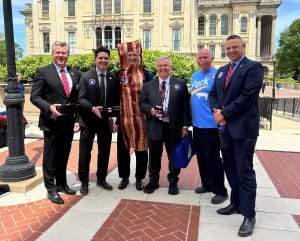Producers Testify Before Congress About Feed Availability Challenges
Steve Meyer, president of Paragon Economics, Inc., noted that subsidized ethanol has meant record-high corn prices, record-high costs of production for meat and poultry, resulting in lower per capita meat and poultry output and, finally, record-high meat prices. He laid out what this has meant in terms of dollars and jobs for the U.S. pork industry.
September 15, 2011

In a hearing Wednesday before the House Committee on Agriculture’s Subcommittee on Livestock, Dairy and Poultry, several producers and an agricultural economist testified about the challenges meat and poultry producers are facing in terms of feed availability, all citing federal ethanol policies as a reason for negatively impacting the viability of the meat and poultry sectors.
Steve Meyer, president of Paragon Economics, Inc., noted that subsidized ethanol has meant record-high corn prices, record-high costs of production for meat and poultry, resulting in lower per capita meat and poultry output and, finally, record-high meat prices. He laid out what this has meant in terms of dollars and jobs for the U.S. pork industry.
“The U.S. pork industry lost $6 billion in equity from 2007 through 2009, but improved profitability did not stop the exodus of pork producers in 2010,” Meyer said in his prepared testimony. “From 2007 through 2010, 6,350 hog operations exited the industry and 84% of them held 500 or fewer hogs in inventory. During that same five years, 30,510 cattle and calf operations and 24,350 beef cow operations exited the industry. The vast majority of these closures, too, were among small operations.”
Ted Seger, a turkey producer and president of Farbest Foods, Inc. in Huntingburg, IN, expressed grave concerns about any new federal investment in “infrastructure” for ethanol. “It is hard to believe that the federal government would entertain such a venture when it is having troublepaying its bills and would put another taxpayer-funded program on the books,” Seger noted in his testimony. “To move from one federal support structure to another only goes to exacerbate financial problems and it is time for the federal government to stop supporting this more than 30-year-old industry. With a guaranteed market for their product, it would seem reasonable that the ethanol industry should be profitable enough to begin developing its own infrastructure.”
While there are many critical issues impacting the viability of the chicken industry, Michael Welch, president and CEO of Harrison Poultry in Bethlehem, GA, suggested at the hearing that no issue is more critical than having an adequate supply of grain and oilseeds at reasonable costs, and suggested that the ethanol mandate be revisited.
“The rules of the game should be re-balanced and the playing field should be leveled to permit chicken producers and other animal agriculture producers to more fairly compete for the limited supplies of corn this year and in the next few years,” Welch said. “Included in this effort must be a safety valve to adjust the Renewable Fuels Standard when there is a shortfall in corn supplies.”
Randy Spronk, a pork producer and managing partner of Spronk Brothers III LLP and Ranger Farms in Edgerton, MN, took issue with proposals to increase ethanol blend levels.
“Where mandates and subsidies are allowed to exist, it is unconscionable that long-established laws would be ignored to drive greater ethanol production,” Spronk said in his remarks. “But this is the path the Obama administration has taken in response to demands to allow an increase to 15% (E15) from the current 10% in the amount of ethanol that can be blended into gasoline.”
Nearly all the members of the subcommittee agreed with the views and concerns expressed by the witnesses. Congressman David Scott (D-GA) asked the panel how high the price of corn would have to be to force them to stop their operations. Welch said that prices are already too high and cannot be sustained in the long term. If the price of corn remains this high, he stated that poultry prices would have to be raised 20% to break even.
Congressman Reid Ribble (R-WI) asked what changes to federal policy the panel would suggest to help this problem. They all agreed that reforming the Renewable Fuel Standard is the only way to end the high demand on corn.
This report was supplied by the American Meat Institute. More information and complete copies of witness’ testimony are available at: http://agriculture.house.gov/hearings/hearingDetails.aspx?NewsID=1450.
You May Also Like


